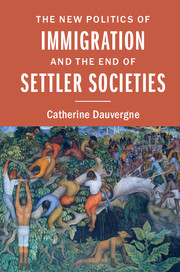PART 1 - THE END OF SETTLER SOCIETIES
Published online by Cambridge University Press: 05 March 2016
Summary
The end of settler societies belongs to the twenty-first century. The transformations of the twentieth century brought increasing migration restrictions and a hardening of borders, but the ethos of the settler society largely survived this transformation. In contrast, the opening of the twenty-first century has seen a deep reorientation of immigration laws and politics that has pushed the settler society paradigm into the past.
The demise of settler societies has been brought about by three factors. The first is the crisis of asylum, which has rapidly picked up speed since 2001, and in mid-2015 is escalating exponentially. The second is a deep fear of Islamic fundamentalism, which challenges liberal approaches to immigration. The third factor is the end of ideological multiculturalism. While multiculturalism persists as a description of many societies, without its ideological functions it loses much of its political relevance.
These factors are presented chronologically, but also in order of increasing complexity and proximity to the core meaning of the settler society paradigm. The asylum crisis is the most straightforward. Given the way that international refugee law impinges on state sovereignty, it is clear why states develop an oppositional posture towards it, at least some of the time. Additionally, asylum flows truly do bring strangers to the door of the prosperous migrant-receiving states as most refugee-producing states are in the global South. The fear of fundamental Islam is more complex. It cannot be explained by legal formalism, and it embeds, even at a cursory level, a discomfiting line-drawing exercise: separating Islam from Islamic fundamentalism. It is closer to the core of our immigration politics than asylum questions because it presents core questions about the so-called neutrality and meritocracy that settler state migration policy has pursued for more than three decades now. The demise of multiculturalism is the most complicated of all. As multiculturalism has been central to the national identities of the paradigmatic settler states, a shift within it is both the most difficult to discern, and the most important for confirming the diagnosis of the end of settler societies. The demise of multiculturalism can be read in part as a response to the first two shifts; it goes to the heart of how these nations identify as nations.
- Type
- Chapter
- Information
- Publisher: Cambridge University PressPrint publication year: 2016



